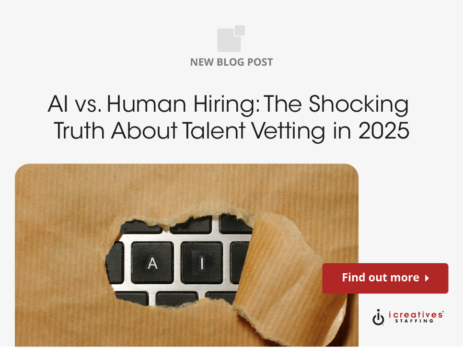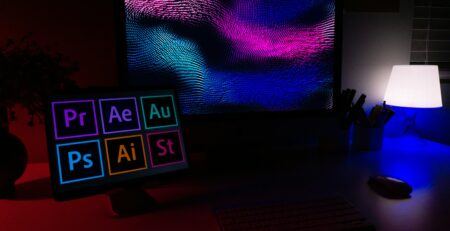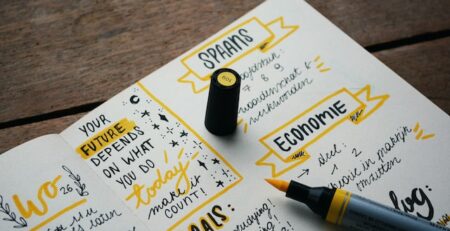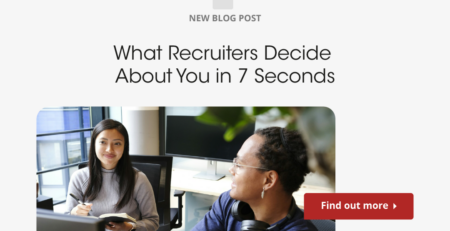AI vs. Human Hiring: The Shocking Truth About Talent Vetting in 2025
Now in 2025, the landscape of recruitment has been significantly transformed by the integration of artificial intelligence, marking a pivotal shift in talent acquisition strategies. AI-driven hiring processes, known for their efficiency and precision, are now at the forefront of the recruitment industry. This technological advancement, however, continues to spark intense debate over its impact on the effectiveness, fairness, and the human element within the hiring process.
AI tools, equipped with advanced algorithms and machine learning capabilities, are designed to streamline the recruitment process by quickly analyzing vast amounts of data. These tools can assess a candidate’s suitability for a role based on predefined criteria, potentially reducing biases and human error. Yet, skeptics argue that AI may overlook the nuanced aspects of human behavior and personality that are crucial for certain positions.
On the other hand, traditional human hiring emphasizes interpersonal interactions, allowing recruiters to gauge soft skills and cultural fit more effectively. This method relies heavily on human judgment and experience, which, while invaluable, can sometimes lead to inconsistencies and subjective biases. The challenge, therefore, lies in finding the right balance between leveraging technology and maintaining a human touch.
The implications of choosing between AI and human hiring are profound. Businesses must consider not only the efficiency and cost-effectiveness of their hiring practices but also their impact on candidate experience and corporate culture. As such, the decision to adopt AI-driven recruitment tools must be approached with a comprehensive understanding of both their potential and their limitations.
In this detailed exploration, we will delve into the most pressing questions surrounding AI vs. human hiring, providing insights and evidence-based perspectives to help stakeholders make informed decisions about their recruitment strategies in 2025.
Most Asked Questions About AI vs. Human Hiring
- How is AI transforming talent vetting processes in 2025?
- What challenges do human recruiters face against AI in 2025?
- How can companies balance AI and human elements in hiring?
- What is the impact of AI on the job seeker experience?
- What does the future hold for hiring practices?
How is AI Transforming Talent Vetting Processes in 2025?
In 2025, AI’s role in talent vetting has evolved significantly, becoming a cornerstone in many organizations’ recruitment strategies. The use of AI in this context is multifaceted, impacting several key areas of the hiring process.
Data-Driven Decisions: AI systems analyze large datasets to identify patterns and predict candidate success, reducing reliance on intuition. This method enhances decision-making accuracy and can lead to more successful hiring outcomes.
Automated Screening: AI tools automate the initial screening of resumes, assessing qualifications and experience much faster than human recruiters. This not only speeds up the process but also helps in managing large volumes of applications efficiently.
Enhanced Candidate Matching: Through sophisticated algorithms, AI can match candidates with job vacancies more effectively based on skills, experience, and cultural fit. This precision helps in reducing turnover rates and improving job satisfaction.
Bias Reduction: AI systems are designed to make objective decisions based on data, potentially reducing unconscious biases that humans might introduce. However, it’s crucial to continuously monitor and update these systems to avoid perpetuating existing biases.
Predictive Analytics: AI’s ability to use predictive analytics helps companies forecast hiring needs and candidate success, which is invaluable for strategic planning.
Despite these advancements, the integration of AI into talent vetting must be handled with care to ensure it complements human judgment rather than replacing it. This approach can maximize the strengths of both AI and human recruiters, leading to a more robust hiring process.
For further insights on enhancing your recruitment strategy, consider reading about using a staffing agency.
What Challenges Do Human Recruiters Face Against AI in 2025?
As AI continues to permeate the hiring landscape in 2025, human recruiters face several challenges that could redefine their roles within organizations.
Keeping Up with Technology: One of the primary challenges for human recruiters is staying abreast of the latest AI technologies and understanding how to integrate these tools effectively into their workflows.
Maintaining Relevance: With AI handling more routine tasks, human recruiters must focus on areas where they add unique value, such as building relationships and assessing complex human traits that AI cannot easily quantify.
Ethical Concerns: Human recruiters are often at the forefront of addressing ethical considerations related to AI use in hiring, such as privacy issues and potential biases in AI algorithms.
Candidate Experience: Ensuring a positive candidate experience remains a critical challenge. Human recruiters need to balance the efficiency of AI tools with the need for personal interaction, which candidates highly value.
Adapting to New Roles: As AI takes over more administrative tasks, human recruiters may need to adapt by acquiring new skills, such as data analysis and strategic decision-making.
Despite these challenges, human recruiters play an indispensable role in interpreting data, providing a human touch, and making complex ethical decisions. Their ability to adapt and integrate AI tools into their skill set will be crucial for their continued relevance in the recruitment field.
For more on adapting to workplace changes, see tips for managing a remote workforce.
How Can Companies Balance AI and Human Elements in Hiring?
In 2025, finding the right balance between AI and human elements in hiring is crucial for companies aiming to enhance their recruitment strategies while maintaining a human touch.
Define Clear Roles: Companies should clearly define what aspects of the hiring process should be automated and what should be handled by human recruiters. This clarity helps in leveraging the strengths of both approaches.
Focus on Collaboration: Encouraging collaboration between AI tools and human recruiters can lead to a more comprehensive understanding of each candidate. This synergy can enhance the overall effectiveness of the hiring process.
Continuous Training: Providing ongoing training for human recruiters to understand and use AI tools effectively is essential. This training should also include ethical considerations and ways to mitigate potential biases.
Enhance Candidate Engagement: While AI can handle initial screening and data analysis, human recruiters should take the lead in engaging with candidates, especially during interviews and final assessments.
Monitor and Adjust: Regularly monitoring the outcomes of AI-driven processes and making adjustments based on feedback and results is crucial to ensure that the balance between AI and human input is optimized.
By strategically integrating AI tools with human expertise, companies can create a more dynamic, efficient, and fair hiring process that respects the value of human judgment while benefiting from the efficiency of automation.
Explore further by reading about how to become an effective remote manager.
What is the Impact of AI on the Job Seeker Experience?
The impact of AI on the job seeker experience in 2025 is profound, offering both challenges and opportunities for candidates navigating the digital hiring landscape.
Streamlined Application Processes: AI simplifies the application process by automating data entry and resume screening, reducing the time and effort required from candidates.
Personalized Job Recommendations: AI algorithms can analyze a candidate’s profile and past job searches to recommend positions that match their skills and preferences, potentially improving job satisfaction.
Immediate Feedback: AI-enabled systems can provide immediate feedback on applications and interviews, a significant improvement over the traditional waiting periods.
Bias Concerns: While AI has the potential to reduce human biases, improperly trained AI can introduce new biases, affecting fairness in the hiring process.
Reduced Human Interaction: Some candidates may feel that the reduction in human interaction makes the process less personal, which can be particularly challenging for positions where soft skills are crucial.
The dual-edged nature of AI’s impact on job seekers underscores the need for careful implementation and continuous oversight to ensure that technological advancements enhance the candidate experience without compromising personal interaction and fairness.
For additional insights, consider exploring 10 ways to recognize employees.
What Does the Future Hold for Hiring Practices?
The future of hiring practices is expected to be a dynamic interplay between technological advancements and the evolving needs of the workforce and employers alike.
Increased Integration of AI: AI will become even more integrated into all stages of the hiring process, from sourcing candidates to final hiring decisions.
Hybrid Hiring Models: The future is likely to see a blend of AI and human-driven processes, where technology handles data-heavy tasks and humans focus on personal interactions and decision-making.
Greater Emphasis on Ethics: As AI becomes more prevalent, there will be a greater focus on ethical considerations, such as privacy, consent, and transparency in AI decision-making.
Customization and Personalization: Hiring practices will likely become more customized to individual company and candidate needs, with AI providing the tools to tailor processes more precisely.
Continuous Adaptation and Learning: Both AI systems and human recruiters will need to continuously adapt and learn to keep up with the changing dynamics of the workforce and technological landscape.
The future of hiring is not just about choosing between AI and humans but about how best to integrate the strengths of both to create more effective, fair, and efficient hiring practices.
To delve deeper into productivity enhancements, check out the ultimate guide to boost your productivity with AI tools at work.
Conclusion
The integration of AI into hiring processes by 2025 presents a landscape where the lines between technology and human interaction are increasingly blurred. As AI tools become more sophisticated, they offer significant advantages in terms of efficiency and the potential reduction of biases, making them invaluable assets in the recruitment process.
However, the importance of human intuition and interaction remains irreplaceable in certain aspects of hiring, particularly in understanding the deeper nuances of candidate personalities and maintaining ethical standards. The challenge for businesses, therefore, lies in harnessing the strengths of both AI and human capabilities to create a synergistic and fair hiring process.
As we look to the future, continuous innovation and ethical considerations will be crucial in shaping hiring practices that respect both technological advancements and the intrinsic value of human judgment. The goal will be to foster a recruitment environment that not only optimizes efficiency and fairness but also enhances the overall experience for candidates and recruiters alike.
In this evolving landscape, stakeholders must remain vigilant and proactive, ensuring that the integration of AI in hiring enriches the process without overshadowing the essential human elements that define the workforce.
For further reading on performance management and feedback, visit how to conduct a performance review and honest feedback from employees.
In today’s competitive market, finding the right creative and marketing expert can be a challenge. But with icreatives, you’re in experienced hands. With 37 years in staffing and a track record of matching more than 10,000 employees to over 1,000 companies worldwide, we know how to connect you with the best. Plus, you only pay if you hire—there’s no risk, only results. Ready to find your perfect creative or marketing expert? HIRE WITH ICREATIVES today!












